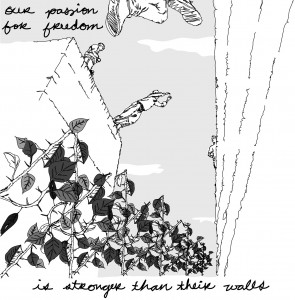Healing From Soul Murder…
**Dedicated to survivors of sexual violence in this time of unspeakable backlash and meanness…
“I learned to live many years ago. Something really bad happened to me, something that changed my life in ways that, if I had a choice, it would never have been changed at all. And what I learned from it is what today, sometimes seems to be the hardest lesson of all.
I learned to love the journey, not the destination. I learned that this is not a dress rehearsal, and that today is the only guarantee you get.
I learned to look at all the good in the world and to try to give some of it back because I believed in it completely and utterly. And I tried to do that, in part, by telling others what I had learned, even though so many people may have thought I sounded like Pollyanna. By telling them this: Consider the lilies of the field. Look at the fuzz on a baby’s ear. Read in the backyard with the sun on your face. Learn to be happy. And think of life as a terminal illness, because, if you do, you will live it with joy and passion, as it ought to be lived. – Anna Quindlen.
I have referenced the fact that I am a survivor of violence several times on this blog. I have never written about the details of my assault because I don’t think that those are the important thing.
I’ve received several e-mails over the past few months from other survivors of violence. I am privileged that they feel comfortable reaching out to me, after all I am a stranger. Yet, I guess that this is in some way the beauty of a blog. It’s possible to form a sort of virtual community with regular readers.
Last month, I received an e-mail from a young woman who identified herself as a 19 year old college student. I’ll call her Laura. She has given me permission to share a bit of her story so that I can make a larger point. She was raped last year by someone who she considered a friend. She is devastated and is having a difficult time moving past her pain. Her e-mail asked me the following profound question:
“Is it possible to recover from soul murder?”
I took a deep breath when I read her words. I am still taking deep breaths. Bad things happen to people every day, unfortunately. Whatever terrible thing it is that you experience can feel like the end of the world. I’ve been there; more than once in my life.
I’ve been exchanging e-mails with Laura and she tells me that it helps to share her feelings with someone beyond her circle of friends and family. She feels like she isn’t understood. She is angry. She wants revenge. I understand and can empathize. She hates the sad looks that she gets from people who know her story. I told her that this incident is only part of her story. It will always remain a part of her story but I know that its current outsized place in her life is temporary. The thing about us as human beings is that we are more resilient than we know. I know that my molecules were in some way rearranged by the various traumas that I have experienced. They are rearranged, perhaps a little dented, but they remain strong.
Laura reached out to me because she read a post that I wrote about the possibilities of restorative and transformative justice in cases of rape. She wanted to know more and to perhaps access some local resources in her community. In the past 3 to 4 years, there have thankfully been more community-based resources developed to address these issues.
She wants some accountability from her rapist. She feels betrayed because she considered him a friend. She is asking a question similar to one that Bell Hooks has posed:
“How do we hold people accountable for wrongdoing and yet at the same time remain in touch with their humanity enough to believe in their capacity to be transformed?”
Yes this sounds great, some may be thinking, but what does accountability look like in practice? It’s a good question. I want to share the following video clip that illustrates a form of accountability very well. In this case, the young man who is featured already spent several years in prison for a crime that he committed so it is not what I would call an example of transformative justice. Still it offers a tangible example of someone who is attempting to be accountable for the harm that he caused to others. We don’t get to see many examples like this so I thought that it was worth sharing.
My simple answer to Laura’s question was: “Yes, it is possible to heal from anything.” I believe that in my bones. I have lived that. I also shared the passage by Ana Quindlen that I quoted to open this post with her. I find solace in those words and hope that she will too.

